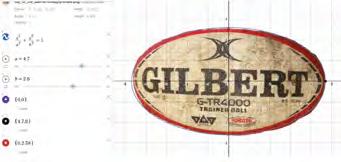
28 minute read
OUR GLOBAL COMMUNITY
St Leonards:
A GLOBAL COMMUNITY
Advertisement
St Leonards is rooted in Scottish tradition but global in composition and outlook – a microcosm of the vibrant, cosmopolitan town of St Andrews. Every year, pupils and staff hail from over 35 nationalities – Australia, Brazil, Bulgaria, Egypt, Moldova, Norway and Uzbekistan were just a few examples of the countries represented on this year’s school roll.
St Leonards encourages us to think outside of the box, jump out of our comfort zones and look at the world from all kinds of perspectives. In an era of globalisation, these international experiences and an international mindset are especially important. I have friends from so many countries including Norway, Malaysia, South Africa, Mexico and the Falkland Islands, and so don’t need to go anywhere to learn about the world – just by talking with one another we have a glimpse into different cultures and ideas. In the boarding community, we have lots of activities to celebrate the diverse cultures represented in our school community. For example, on St Nicholas Day we put our shoes by our bedroom doors which are then filled with sweets by the next morning! Xiamu Zhai, GCSE Pupil My favourite event is International Celebration Day. I like this event because it is interesting to see the different materials and colours used for clothing in different cultures. In my class, there is a mix of countries – my friends are from America, Canada, Russia, China, and Scotland. I like having friends from different countries because it is wonderful to get to know and interact with people from different cultures. I am grateful to be part of the St Leonards community. Sophia Zhou, PYP pupil
I have friends from all over the world: Ireland, England, Kenya, and Zimbabwe to name just a few examples. I love International Day – it’s a great chance for us to dress up in clothing and costumes which celebrate all the different cultures and nationalities at St Leonards. Katherine Rafferty, MYP Pupil
At St Leonards, understanding and learning about other cultures is important – pupils from every nationality are embraced and welcomed. The IB is about more than just learning the curriculum; it teaches you to live with others and prepares you to face real-life challenges with a global perspective. Soraya Manferdini, DP pupil
I have worked and volunteered in a wide range of countries across the world including New Zealand, Singapore, Sweden, and South Africa and so am a big advocate for international awareness. The joy of working at St Leonards is that you get to interact with pupils from a wide range of countries, who have a range of different learning experiences. Our IB curriculums enable you to make links with the pupils’ previous experiences, and gives you the opportunity to discuss and share experiences and cultures. Internationalism is integral to the PYP, and is woven into all of the pupils’ learning experiences ensuring that they have a global perspective. Lauren Clements, PYP Class Teacher


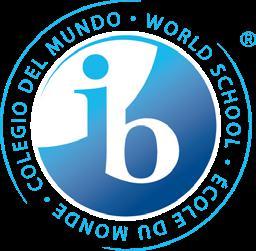

This cultural and linguistic diversity is celebrated daily; pupils are encouraged to be proud of their heritage and to share it with others. For example, to mark International Mother Tongue Day, older pupils read stories in their mother tongues to younger children around the fire pit and Sixth Form students run an after-school club for bilingual pupils in the Primary Years Programme to develop their language skills. In addition, language acquisition is an integral part of our pupils’ learning journeys – all pupils learn a language in addition to their mother tongue, fostering an awareness of an appreciation for other cultures. The celebration of a diverse range of festivals and holidays goes hand-inhand with the multilingualism of the St Leonards community. The school calendar is peppered with international celebrations, with Lunar New Year being a particular highlight each year. This year, the pupils led dumplingmaking workshops, prepared quizzes and presentations, and created beautiful homemade calligraphy posters and lanterns to decorate the boarding houses. The diverse menus served in Restaurant 1877 also reflect our multiculturalism, with ratsherrenpfanne, quesadillas and dal makhani being some of the regular highlights! In line with the IB mission statement, at St Leonards we aim to “develop inquiring, knowledgeable and caring young people who will help create a better and more peaceful world through intercultural understanding and respect”. Together with the aforementioned varied cultural celebrations and our multicultural learning community, the all-through IB curriculum at St Leonards helps develop international-mindedness. Through intercontinental lines of inquiry, pupils inquire into and reflect upon their position as global citizens, before taking action based upon their findings. We encourage pupils to recognise that their decisions and actions can make a huge difference on a local, national and global scale. For example, in the Autumn Term, Year 5 looked at human rights around the world and considered how buying Fair Trade produce can help producers in growing economies to have sustainable and equitable trade relationships. On a school-wide scale, St Leonards now participates in the ‘Meat Free Monday’ initiative to take action against climate change by reducing its carbon footprint. This has prompted important discussions amongst pupils and staff about the small decisions that can be made to help the environment. Paired with the utilisation of
technology and trips which help pupils to recognise the common humanity that unites people of all nations and experience other cultures first hand, these class-based and school-wide initiatives encourage students to value different cultures and to embrace diversity and a range of perspectives, as well as to appreciate the global reach of their decisions and actions. Closer to home, our diverse and global learning community of pupils, parents and staff regularly share insights into a plethora of cultures and issues. This year, we welcomed a range of visiting speakers to share their knowledge and experiences with the pupils. For example, to mark World Day of Social Justice, student representatives from the St Andrews branch of SolidariTee delivered a thought-provoking presentation which challenged the pupils to think about how the media controls the narrative surrounding refugees and how, as global citizens, they can take an active role in making a meaningful difference. Just a few weeks later, it was wonderful to see the pupils channel their efforts into organising donated supplies to be sent to those afflicted by the conflict in Ukraine.




The global nature of the St Leonards learning community – with its diverse perspective, intercultural understanding, and appreciation and celebration of diversity in all its forms – makes this an inspiring place to live and learn. But perhaps most importantly, it ensures pupils leave prepared to face the challenges and opportunities of our increasingly globalised world – true preparation Ad Vitam, for life.
The Learner Profile

‘NORMAL DOESN’T FEEL SO NORMAL TO ME’, I TELL HIM.
‘IT’S NORMAL TO FEEL THAT WAY,’ HE REPLIES.
AN EXCHANGE BETWEEN SANCHO AND QUICHOTTE IN SALMAN RUSHDIE’S EPONYMOUS 2019 NOVEL.
Year upon year, our Year 13 leavers achieve excellent public examination results and secure places at leading UK and international universities, and this year was no exception: 80% of pupils secured places at their first choice universities in Scotland, the UK and across the globe. Our average points score was an alltime high of 36 points, with a quarter of pupils scoring over 40, placing them in the top 7% of candidates worldwide. These excellent results are testament to the hard work and dedication of both pupils and staff, and deserve congratulations and celebrations. However, at St Leonards, we do not simply measure success by league table standings or grade point averages. Our educational mission is so much broader and, underpinned by our inspiring, all-through International Baccalaureate curriculum, we aim to help pupils develop the skills and interests that they need to succeed in today’s everchanging world – to be prepared Ad Vitam, for life. The aim of all four IB programmes – the PYP, MYP, CP and DP – is to develop internationally-minded young people who recognise their common humanity and shared guardianship of the planet, and help to create a better and more peaceful world. These aspirations are underpinned by the Learner Profile, a holistic set of attributes that promote the education of the whole person and provide pupils with a toolkit to face the challenges that life will inevitably throw at them. I am immensely proud to be part of a school that has this pedagogical perspective. So, in a nutshell, what is our approach to teaching and learning at St Leonards? We seek to develop learners who are naturally curious inquirers about the world around them, knowledgeable about the concepts, ideas and issues in a breadth of academic disciplines critical and creative thinkers who are able to tackle complex problems, and clear and confident communicators who are open-minded and reflective, respecting and evaluating the perspectives, values and traditions of others. Furthermore, our pupils are encouraged to be risktakers who are able to tackle new challenges and activities with courage and confidence, thus embracing the wealth of curricular and co-curricular opportunities at St Leonards and developing a balanced approach to life which safeguards their wellbeing. As well as looking after themselves, we encourage students to be principled, caring citizens who are compassionate, empathetic and respectful, seeking to make a meaningful difference to their local and global communities My thanks go to Alfonso Iannone, our Head of English, for sharing the fantastic literary exchange above which encapsulates how many of us feel as we adapt to life in a post-Covid world. At St Leonards, our ‘new normal’ isn’t all that different as the Learner Profile attributes still underpin everything that we do. In the pages that follow, you will find a wealth of examples of the Learner Profile in action from Year 1 up to Year 13 – I hope this section of the Gazette gives you a flavour of our vibrant and inspiring character of teaching and learning. Dawn Pemberton-Hislop Senior Deputy Head
Knowledgeable
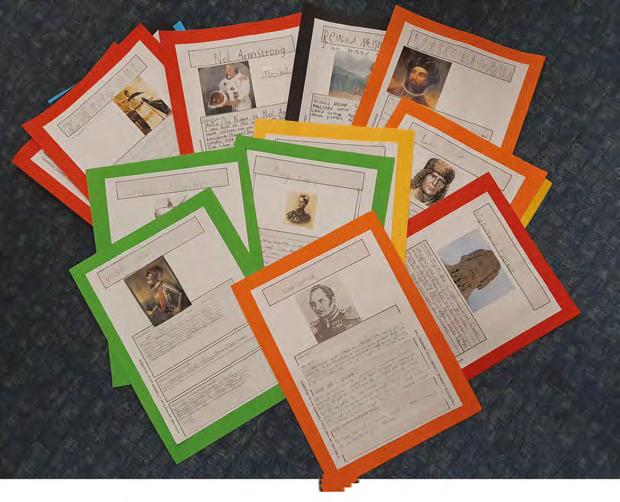




Past and Present Explorers
The Year 5 pupils have wholeheartedly embraced their inquiries this year, in particular their inquiry into past and present explorers. The pupils researched an explorer of their choice, before showcasing their new-found knowledge by presenting their findings to the camera in a collaborative video timeline and creating colourful posters. Bridging the Gap
There’s been a real buzz in the Psychology Department this year, with a record 57 pupils choosing to study the subject at Sixth Form level. The pupils have inquired into a wide range of topics and become increasingly knowledgeable, bridging the gap between the scientific and social perspectives. Highlights have included counting Skittles in the sunshine to learn more about sampling, playing ‘Psychology Jeopardy’, and learning about the Stanford Prison Experiment. Special mention must also go to the members of the Psychology Club who have inquired into personality, as well as the psychology of criminals and phobias, on Tuesday night each week. Designing Devices
For their Group 4 Diploma project, the Year 12 pupils were tasked with designing devices that would be able to record the duration of a piece of music. The pupils worked in groups, drawing together their knowledge of different scientific disciplines to come up with a wealth of creative inventions. For example, the physicists used their knowledge of harmonic oscillations and sound waves.
Climate Change Connections
Looking at climate change through the concept lens of connection had a huge impact on the Year 3 pupils. The children researched why animals become endangered, identifying both environmental factors, such as floods, droughts and farming, and human factors, including poaching and hunting. They consolidated their learning by making a class set of Top Trumps to play with their friends, and also took small steps to become climate action superheroes: truth talkers, fume fighters, recycle rangers and energy experts! The children turned off lights around school, shared their knowledge of ‘adopt an animal’ schemes, cycled to school to reduce their carbon footprint, and advocated for additional recycling.
Caring
Move for Movember
At St Leonards, it is not just pupils but also staff who strive to embody the Learner Profile attributes. This year, our Head, Mr Brian, completed two impressive feats to raise funds and awareness for charitable causes. As part of the ‘Move for Movember’ initiative he completed an impressive 60km run along the Fife Coastal Path, and later in the year cycled the North Coast 500 in four days for the local charity Families First. Mr Brian’s second endurance challenge was inspired by Logan Graham, who cycled the route and raised over £1000 for Long Covid Kids during his Easter holiday. Whilst completing the endurance challenge, Logan bumped into Mrs PembertonHislop and Mr Hislop! Charity Campout
Having been moved by the plight of Ukrainian refugees, Harry Elles braved the elements to camp out in his garden for seven nights to raise money for the Disasters Emergency Committee. His campout raised an amazing £1,397 for charity, and even received coverage in the local press.



Cultural Celebrations
This year, the Year 1 pupils inquired into celebrations under the transdisciplinary theme of ‘Who We Are’. By learning more about other histories and cultures, the children developed their open-mindedness and had a wonderful time immersing themselves in the traditions of Hanukkah, Chinese New Year, American Thanksgiving, Persian New Year, Christmas and Easter. These celebrations opened up lots of opportunities for the children to sample and bake a variety of foods, and also to make some beautiful crafts.
Pupil Perspectives
Throughout March, the PYP pupils focused their attention on the Learner Profile attribute of being open-minded. The Year 5 pupils enjoyed reading How to Live Forever by Colin Thompson, which prompted a thought-provoking and mature discussion about the idea of eternal life. The pupils evaluated a range of points of view and embraced the perspectives and values of their peers, thus showing themselves to be truly open-minded learners. Set Text Studies
Through their study of their prescribed literary texts, our GCSE Latin pupils developed their open-mindedness. The pupils immersed themselves in Julius Caesar’s invasion of Britain, Livy’s account of the Carthaginian Hannibal getting his army to cross the Alps, and the fall of Troy from Virgil’s Aeneid. In doing so, the pupils have not only developed their linguistic skills, but, through the beliefs and ideas expressed within the texts, gained a deeper understanding of the ancient cultures within which they were written.



Open-minded

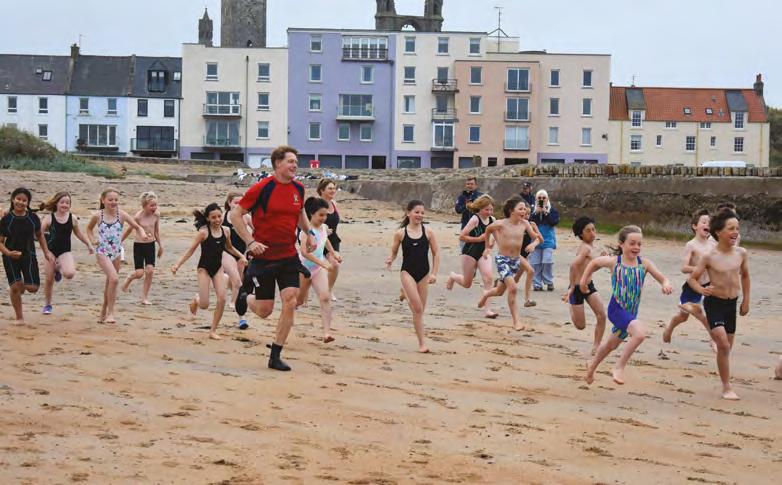
Pantomime Performance
Moving up to Year 4 is a significant milestone in the Primary Years Programme: the children are increasingly encouraged to take ownership of themselves, start to play competitive fixtures against other schools, try new subjects, and take up residence in Hepburn House! The Year 4 pupils have embraced all these new experiences and have shown themselves to be responsible risk-takers who are confident tackling new and unfamiliar situations. Perhaps most notably, when reflecting upon the past year, the children all agreed that staging their pantomime production of Cinderella was their greatest achievement. This production was part of their inquiry into how people use The Arts to express their thoughts, feelings, opinions and beliefs. The children wrote their own words, sourced some fantastic costumes, and then pushed themselves out of their comfort zones by stepping onto the stage to sing and perform in front of a live audience!
Junior Judo
The Junior pupils have loved learning the basic moves and principles of Judo in an energetic and fun new afterschool club led by former Olympian and Commonwealth Games judoka John Buchanan. The children have honed their stance, grip and movements, and by learning a new sport have shown themselves to be risk-takers.
Risk-takers
Daring Dooks
With the aim of becoming fully-fledged members of the Polar Bear Club, Junior pupils brave the chilly waters of the North Sea for half-termly ‘dooks’. The pupils run into the waters to the sounds of the bagpipes and the cheers of their family and friends before returning to school for warming mugs of hot chocolate. By pushing themselves out of their comfort zones, the children achieve things that they never thought possible, building confidence and resilience in the process … we are so proud of our responsible risk takers! Car Calculations
During an Economics lesson, Mr Funcasta asked his class the following question: You want to buy a second-hand car. You know that 50% of the cars available are good quality, and that the other 50% are bad quality (‘lemons’). You are not able to ascertain the quality of the car when you are buying it. You value a good quality car at £2,000, and a ‘lemon’ at £1,000. In light of this, what is the maximum amount that you would be willing to pay for a second-hand car? A £1,000 B £1,250 C £1,500 D £1,750
Lots of pupils chose A, showing themselves to be extremely riskaverse. C was also very popular, a demonstration of risk-neutral behaviour. In the real world, we would expect to observe B as a frequent choice, as people tend to be willing to take some calculated risks. Perhaps unsurprisingly, D was not selected by any of the pupils – this would have demonstrated risk-loving behaviour. Whilst the Sixth Form economists did not show themselves to be risk-lovers when faced with this problem, they have nevertheless stepped outside their comfort zones, explored new ideas and been courageous in their learning this year, thus showing themselves to be responsible risk-takers in a different way.
Literary Explorations
Throughout the academic year, the Year 7 pupils showed themselves to be risk-takers in their English lessons. The pupils have embraced their study of a range of new literary and non-literary texts, including Arabic poetry and graphic novels.


Historical Journalism
By creating a film as their summative work for their historical inquiry into migration and the Vikings, the Year 7 pupils showed themselves to be true risk-takers. The pupils assumed various roles: acting, scriptwriting, creating props, designing costumes and editing the footage. The finished films focus on beach landings, the construction of boats and weapons, the storming of villages and churches, and the reenactment of debates in a Viking Thing (parliament). The pupils also forayed into historical journalism, creating eye-catching newspaper spreads as part of their inquiry into the First World War, featuring headline news, domestic adverts, propaganda and recruitment campaigns. Taking risks and pushing themselves out of their comfort zones not only led to the acquisition of new practical skills, but also, and most importantly, fostered personal growth.

Reflective
Constructing Chairs
The story of Goldilocks and the Three Bears opened up lots of opportunities for the Year 1 children to develop their Learner Profile attributes. For example, the pupils were tasked with building a chair for Baby Bear using only newspapers, art straws and sellotape. The children worked in groups communicating their ideas, thinking about how they could make different parts, listening to each other’s ideas and opinions, and reflecting on what was and wasn’t working. The pupils also headed down to the East Sands to fashion chairs out of twigs, branches, logs and other driftwood. It was wonderful to see them rise to the challenge and construct some creative and imaginative chairs!
Inquirers
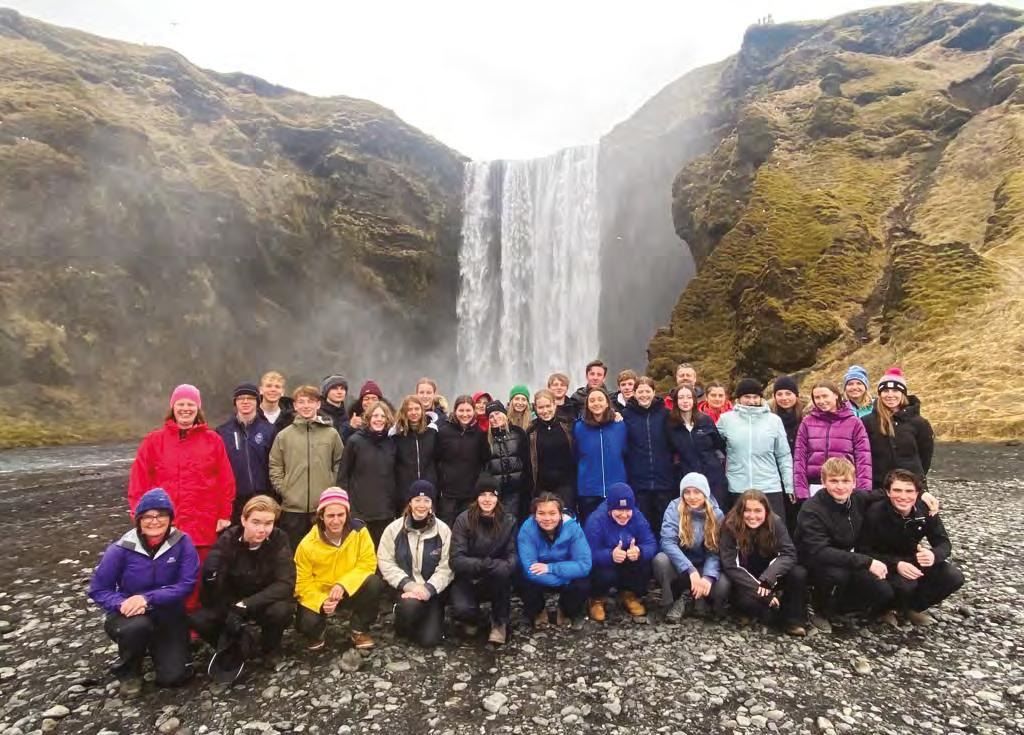
Geography in Action
At the start of the Easter holidays, a group of Senior students travelled to Iceland. The trip was an opportunity for the students to take their inquiries outside the classroom and to see Geography in action. The group’s adventures saw them immersed in the volcanic landscape of the island, soaking in the geysers, waterfalls, rift valleys, coastal stacks, basalt columns, caves, and glaciers. They also explored the beautiful capital, Reykjavík, and headed for the unique smelling experience of the Krysuvik mud puddles, where the boiling mud releases a strong sulphuric smell, and the Nathagi Valley where they walked on newly-formed lava which was still giving off heat. Varied Vocabulary
Our bilingual learners showed themselves to be inquisitive learners, enthusiastic to investigate, discover, explore, explain and define the past and understand how we have arrived at our world as we know it today. The Year 9 EAL pupils enjoyed travelling to Verdant Works in Dundee to learn more about the jute industry in the nineteenth century, whilst the Year 12 English B students explored artistic movements from various eras and discussed the aesthetic, cultural and historical relevance of a work of art of their choice. Both of these learning experiences allowed the pupils to develop their academic vocabulary in contextualised and personally relevant ways. Ernst Ludwig Kircher, Nollendorflplatz (1912)


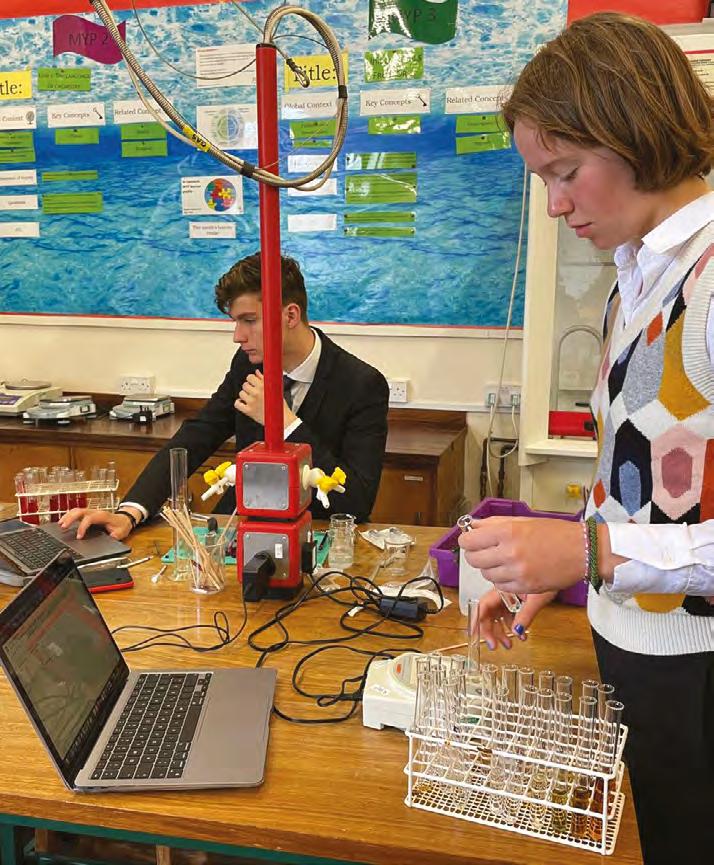
See, Think, Wonder
The Year 4 pupils enjoyed going on an inquiry adventure up to St Leonards Chapel to meet Mr White, a St Leonards Senior who now works at the School teaching organ and piano. Using the framework of ‘see, think, wonder’, the pupils posed some excellent questions to Mr White, inquiring about the materials, sounds and techniques of the instrument. Independent Investigations
In the Summer Term, the Year 12 biologists worked hard to plan and carry out their individual investigations. This project gave the students the opportunity to delve into a topic which piques their interest and then plan an investigation. Research questions ranged from the effect of household cleaning products on plant growth to how ethanol affects membrane permeability. Having completed their preliminary investigations and immersed themselves in scientific literature, there was a real buzz in the department on IA day as the students enthusiastically collected data and analysed the significance of their results. Excellent inquiry skills were displayed by all. Polished Presentations
Years 12 and 13 showcased their inquiring minds in their English Literature and English Language & Literature Individual Oral presentations. In these assessments, the students discuss how an important global issue of their choice is reflected in two of the works which they have studied. As ever, the responses were varied, enthusiastic and engaged focusing on everything from the subversion of societal stereotypes to the consequences of willful ignorance by those in power on the individual and the environment.
Communicators

TOK Talks
Year 12 showed themselves to be confident communicators at the TOK Exhibitions which, this year, took place outside in QML Gardens. The pupils each selected a prompt question and three objects for their exhibition, which required them to explain the real world context of the object and how it linked to their chosen line of inquiry. For example, Nieve Greener discussed the front page of a compendium on witchcraft lore, Daemonologie (1597), with reference to the prompt ‘What counts as a good justification for a claim?’; Ludovica Raddi brought a basketball and discussed the question ‘Are some types of knowledge more useful than others?’; and Julian Langer selected a fraternity ring to consider the prompt ‘How is current knowledge shaped by its historical development?’. It was wonderful to see the pupils present their findings in a cogent manner, and also to see them answer the pertinent questions posed to them by their peers.
Exhibition Event
As their journey through the Primary Years Programme drew to a close, the Year 6 pupils had a wonderful week showcasing how they express themselves at their PYP Exhibition, held in St Katharines Hall. The pupils presented their inquiries to their peers, parents and staff based on the central idea of ‘how our passions can make a difference to the lives of others’. An amazing variety of topics were covered, including superheroes, books, art, cancer, the environment and sports. They also demonstrated their communication skills by staging a fantastic production of Peter Pan in the Auditorium.
Spotlight on Stories
The Year 11 pupils enjoyed getting into character and costume to bring Shakespeare to life in their English lessons – a particular highlight was acting out the famous witches scene in Macbeth. In doing so, the pupils not only gleaned a deeper understanding of the text, but also developed their communication and teamwork skills. The Year 2 pupils honed their communication skills through their Unit of Inquiry into stories and

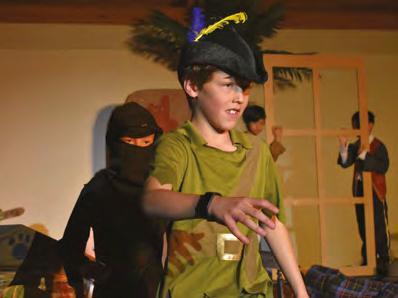

folktales from around the world. The children learned how stories from the past were typically told to convey a message or a meaning, and enjoyed inquiring into the similarities and differences between tales from different cultures. In particular, they spent time comparing and contrasting food tales, namely the American tale of The Gingerbread Man and the Scottish tale of The Wee Bannock. The class also considered how stories evoke and communicate feelings, and stir emotional responses in the listeners, all key facets of the art of communication. The pupils demonstrated agency by researching and choosing their own stories and then sharing them with their peers – stories that reflect something of their own heritage and which communicate something of who they are. A particular highlight of this inquiry was listening to several of the children share tales in their mother tongues: a true celebration of our wonderful international community and the unique communication skills of each and every child! Learning Languages
Language acquisition is central to the International Baccalaureate curriculums, with Italian, Mandarin, Russian, Japanese and Dutch delivered alongside the core curriculum languages of French, German and Spanish. Did you know that every pupil at St Leonards learns a language in addition to their mother tongue? It really has been wonderful to see our pupils grow as communicators this year in their language lessons, not to mention the intercultural understanding, international mindedness, tolerance and empathy which they have also developed through the study of other cultures and languages.

Principled


Break the Bias
At St Leonards, we are committed to helping to create a world free of bias, stereotypes and discrimination, where difference is valued and celebrated. To mark International Women’s Day, the St Leonards Association of Girls, together with Director of Drama, Ms McQuade-Powell, led a fantastic assembly, complete with a video element and, across the campus, pupils and staff crossed their arms to show solidarity with the campaign to break the bias, call out inequality, reject discrimination, and smash stereotypes. Sustainable School
St Leonards has made a number of recent operational changes to reduce its carbon footprint. For example, recycled paper is used for all internal documents, there are mixed recycling points across campus, and the community periodically participates in ‘Meat Free Monday’. However, our approach is not simply ‘top down’ – we are committed to educating and enthusing pupils about the environment through curricular and co-curricular initiatives. This year has seen the launch of the pupil-led Green Team, who have spearheaded a number of projects including erecting signs to discourage idling at drop-off and pick-up; schoolwide participation in the Cycle to School and Cycle to Work schemes; and the inaugural COP St Leonards at which the Year 6 pupils assumed the role of delegates, preparing speeches and presentations that called upon world leaders (otherwise known as teachers!) to work together for equitable access to resources.
Learning at the Links

As part of their career-related study, the Years 12 and 13 CP students enjoyed a fantastic hands-on workshop with The Links Trust in St Andrews. The workshop centred around the question ‘How might we engage with the largest audience of digital native golf fans who may never visit St Andrews?’, and tied into the charity’s digital transformation project which, in collaboration with IBM, is seeking to future-proof customer experience and ensure that their digital platforms remain relevant for future generations. The students used empathy and scenario maps to gain a deeper insight into their customers, analysing what their customers would say, think, do and feel. The maps helped them to develop a balanced perspective on the issue at hand, and the pupils came up with some excellent suggestions!



Balanced
Environmental Eyes
Years 4-6 enjoyed a hike along the Fife Coastal Path from Boarhills to St Andrews. The pupils enjoyed spending time in the great outdoors with their friends, and also did their bit for the environment by collecting waste from the beach and discussing the ramifications that the litter has on marine wildlife. All in all, a perfectly balanced day! A-Z of Activities
The values of the IB Learner Profile also underpin the co-curriculum at St Leonards. This year, there were over 50 activities on offer encompassing everything from aquathlon to a cappella, beekeeping, bushcraft, chess, debating, dance, piping, story club and swimming. By participating in sports, the arts, community service and other activities, the pupils have had great fun, achieved intellectual, physical and emotional balance, and supported their personal wellbeing.
Thinkers
Historical Adventures
At St Leonards, pupils are fortunate to have access to a rich bank of resources in Queen Mary’s Library which are particularly valuable for the History IAs. For these assessments, the Year 12 students must seek out reliable sources and use them to construct robust, evidence-based arguments. In this process, they must think critically to cross-reference source material and draw valid conclusions, mirroring the framework of university-level study. This year’s cohort investigated a wide range of topics – everything from the American War of Independence to Ping Pong Diplomacy, Sophie Scholl and the Arab-Israeli War. These thinking skills are both valuable for and essential to successfully navigating the presentday world; with events and issues that challenge our world today, the need for these skills has never been more important. Scientific Scenarios
For over a decade, The Royal Society of Chemistry has organised a nationwide ‘Top of the Bench’ competition for pupils in Years 9-11 to nurture curiosity and promote practical and teamwork skills. This year, due to Covid restrictions, the Fife and Tayside regional heat took place online. The St Leonards team of Nicholas Müller, Polly Morris, Eliza König and William Berry showed themselves to be creative thinkers, drawing upon their curriculum knowledge to answer 69 different questions which required them to identify scientific words with the vowels missing, pair equations with descriptions, study crystal structures and match them to the correct compounds, and think about chemical safety. Congratulations to the pupils who finished in fourth place – their ability to think laterally and logically, as well as to be knowledgeable and courageous risk-takers, inquirers and communicators is to be applauded. Mathematical Modelling
The Year 13 DP mathematicians showed themselves to be astute and perspicacious thinkers when completing their coursework, which required them to explore the mathematics behind a topic of interest to them. As ever, there were a wide range of topics explored, including: • Using the Phi moment to explore the relationship between the golden ratio and the quality of music; • Modelling the beak of a gull to calculate its volume; • Investigating spiral patterns in nature using complex numbers; • Approximating how much gold was used to cover the exterior of St Isaac’s
Church and establishing if smaller hands make it more difficult to catch a rugby ball by calculating the surface area; and • Conducting a statistical analysis to investigate the relationship between the number of people standing in the
Jannettas queue and the temperature outside. Archie Clarke cut a rugby ball along its seams as part of his coursework. Pictured is his initial function to model the rugby ball, and his final mathematical model of the ball. Leonardo di Cosmo took the photograph (bottom right) of a gull on the West Sands, and it inspired him to generate a gull’s beak using his model. Scientific Solutions
The Computer Science syllabuses foster the development of computational thinking and problem-solving skills. For example, the DP IA projects require students to develop innovative and original solutions to problems presented by clients. Whilst coding and developing software, the students must be willing to take risks and learn from their failures to inform their ongoing search for a solution. It’s immensely satisfying for the students when they have that eureka moment!


